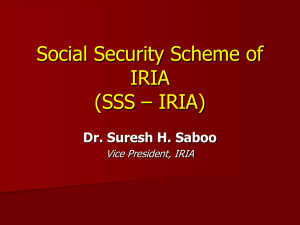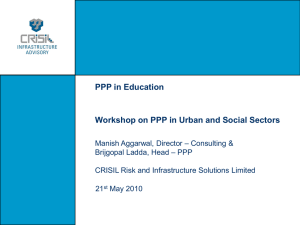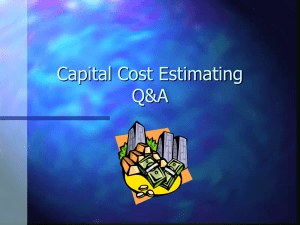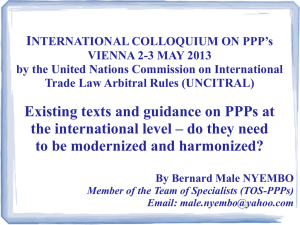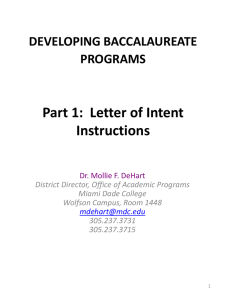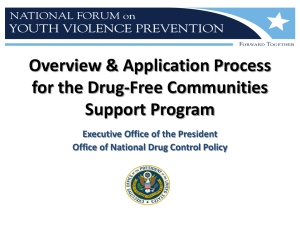Public Private Partnership
advertisement
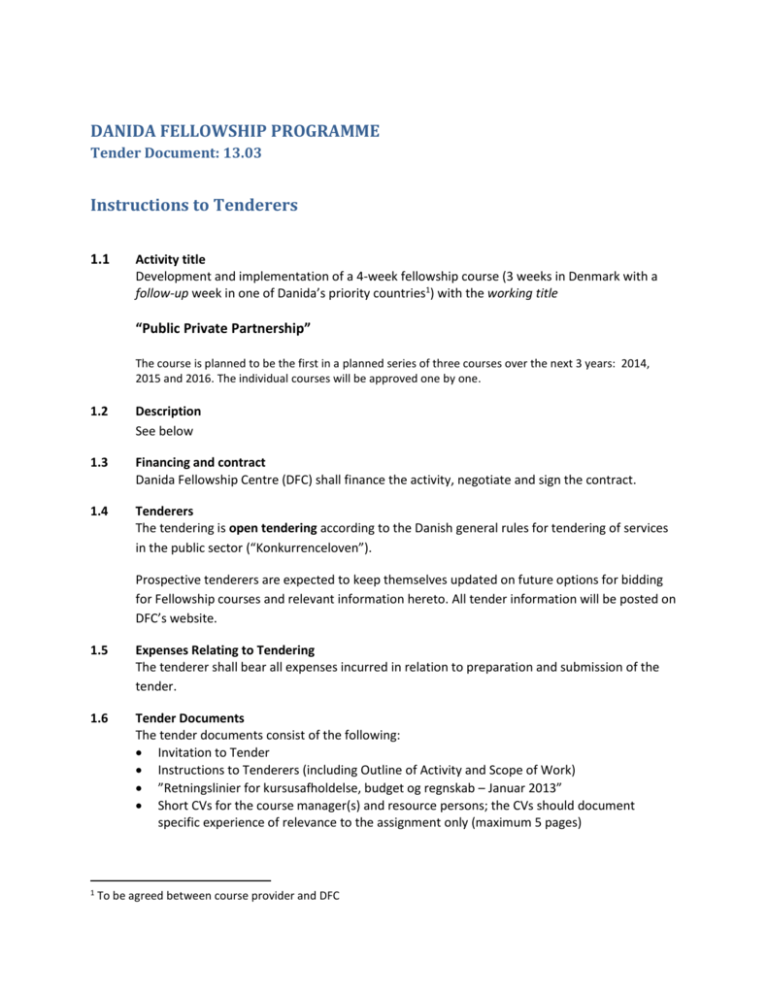
DANIDA FELLOWSHIP PROGRAMME Tender Document: 13.03 Instructions to Tenderers 1.1 Activity title Development and implementation of a 4-week fellowship course (3 weeks in Denmark with a follow-up week in one of Danida’s priority countries1) with the working title “Public Private Partnership” The course is planned to be the first in a planned series of three courses over the next 3 years: 2014, 2015 and 2016. The individual courses will be approved one by one. 1.2 Description See below 1.3 Financing and contract Danida Fellowship Centre (DFC) shall finance the activity, negotiate and sign the contract. 1.4 Tenderers The tendering is open tendering according to the Danish general rules for tendering of services in the public sector (“Konkurrenceloven”). Prospective tenderers are expected to keep themselves updated on future options for bidding for Fellowship courses and relevant information hereto. All tender information will be posted on DFC’s website. 1.5 Expenses Relating to Tendering The tenderer shall bear all expenses incurred in relation to preparation and submission of the tender. 1.6 Tender Documents The tender documents consist of the following: Invitation to Tender Instructions to Tenderers (including Outline of Activity and Scope of Work) ”Retningslinier for kursusafholdelse, budget og regnskab – Januar 2013” Short CVs for the course manager(s) and resource persons; the CVs should document specific experience of relevance to the assignment only (maximum 5 pages) 1 To be agreed between course provider and DFC For general information regarding the Danida Fellowship Programme and DFC, see www.dfcentre.com 1.7 Price The financial offer must be prepared according to DFC’s guidelines (“Retningslinier for kursusafholdelse, budget og regnskab – Januar 2013”), refer DFC’s website. The financial offer price shall be divided into one, possibly two or three, separate parts: I: Detailed course budget (development and implementation of the course) with overhead specified for each activity (e.g. course management, facilitation, guidance on excursions, counselling, etc.). Curriculum Development has to be indicated separately. II: One budget for accommodation in Denmark (if required) III: One outline budget for the follow-up week including reimbursable costs for course manager/facilitator(s) The financial offer must reflect that the course is planned to be repeated (a total of 3 courses); thus, it is expected that the fee shall be reduced for courses 2 and 3; the reduction should be clearly indicated in the financial offer. 1.8 Human Resources The proposed human resources shall have appropriate professional as well as educational qualifications, professional experience from at least one developing country (a minimum of 6 months combined) and fluency in English. The offer must include a brief presentation of the candidates assigned and their responsibilities pertaining to this assignment, as well as an overview showing detailed allocation of hours and responsibilities for each proposed member of staff. Failure to do so will result in the tender being considered non-compliant. In addition, the tenderer must annex the proposed candidates’ CVs with selected assignments relevant to this course only. A balanced team of candidates in terms of gender and years of experience will be considered an advantage. DFC reserves the right to request changes of proposed staff during contract negotiations. Replacement of proposed staff after entering of contract can only be allowed upon approval by DFC. The tendering entity shall be requested to indicate whether they have the ability to conduct the course in other languages than English. 1.9 Clarifications Questions of clarification can be raised until 15 November 2013. The questions raised and answers given will be forwarded to all tenderers on 19 November 2013. 1.10 Contents of the tender I A proposal describing the development and implementation of a four-week (3+1) Fellowship Course in “Public Private Partnership” II CVs for proposed candidates (maximum 5 pages) – CVs longer than 5 pages will be considered non-compliant III Selected references (maximum 10, not older than 4 years) IV Amendments to the activity (if any) V A financial offer 1.11 Validity of tender Tender validity period is 90 days 1.12 Submission of tender The Tender shall be written in English and submitted in a sealed envelope marked: Tender 13.03 to: DFC, Hostrupsvej 22, 1950 Frederiksberg C. Tenders must be received at DFC in an electronic copy and two hard copies no later than 2 December 2013 at 12.00am. Please note that only tenderers having notified DFC by 11 November 2013 of their intention to submit a tender will be considered by the evaluation committee. 1.13 Tender evaluation DFC will carry out the evaluation based on the following criteria: Contents of the proposal (vision, approach and methodology, etc.) – 30% Resources (e.g. staff, company experience, venue, facilities, etc.) – 50% Price (e.g. no. of hours for curriculum development, budget for subsequent courses) – 20% Amendments to the activity (if any) may lift the score by a maximum of 10%, if found relevant by DFC For study places within the Copenhagen area, DFC will provide accommodation etc. Outside Copenhagen, these costs shall be included as a separate part of the tender. The geographical venue of the course shall not influence the tender evaluation; this is also the case, should it later be decided to conduct part of the course in a developing country. DFC reserves the right to accept any of the tenders or reject all. The tenderer who has submitted the best acceptable offer will be invited for contract negotiations. DFC will notify all tenderers on which entity will be invited for contract negotiations by the latest on 20 December 2013. The selection of the winning proposal will be announced on DFC’s website no later than 3 weeks after tender submission. DFC shall not be obliged to state the reasons for its decision nor shall it enter into any discussion or correspondence with tenderers on the results of the tender. Outline of Activity Introduction The course Public Private Partnership course is planned to take place during 2014 with three weeks in Denmark (the exact course period to be negotiated) and one week later in 2014 in a developing country (again - course period to be agreed between course provider and DFC), suggestion for a partner in a developing country can be given by DFC upon request. Similar courses are planned to be arranged in the coming years with the same objectives and basic contents, although course evaluation(s) may result in minor changes in the approach, design, and implementation in order to enhance the effects of future courses. Course Characteristics Background and context The Danish Strategy “Right to a Better Life” (2012) focuses amongst other on partnering with the private sector, including cooperation with private companies and foundations. This is a reflection of an increasing international recognition that the private sector must play a key role in development, amongst other, as a provider of employment, tax payer and as an investor. There is a massive need for investment in infrastructure in developing countries. An estimated 2.5 billion people lack access to sanitation services, 1.6 billion live without electricity, 1 billion lack access to roads and 900 million drink unsafe water2. The estimated investment-gaps in public services cannot be filled by governments and donor resources alone. Consequently, many governments turn to the private sector to mobilise private capital and speed up delivery of better managed infrastructure. The private sector is increasingly getting involved in designing, building, financing, and/ or operating new and existing infrastructure facilities through public private partnerships. The involvement of the private sector takes place in a multiplicity of different forms. There is no single, internationally accepted definition of “Public Private Partnership”. The Public Private Infrastructure Advisory Facility (PPIAF) defines a PPP as “A long-term contract between a private party and a government agency, for providing a public asset or service, in which the private party bears significant risk and management responsibility”. While PPPs can contribute to accelerating infrastructure investments, cases from all over the world also highlight the considerable challenges related to setting up and implementing successful PPPs. This course is planned in consideration of the opportunities and challenges related to public private partnerships and the need for an improved understanding of the most important building blocks of a successful public private partnership. 2 PPIAF: PPPs an introduction Course goal Participants have gained practical knowledge of the core concepts, strategies and tools, which will enable them to initiate successful public private partnerships when returning to their home country. Course impact Participants shall be able to directly apply the course content in a way that enhances progress in their respective areas of work and, in the long-term, supports the attainment of strategic objectives for identifying, selecting and managing public-private partnerships in the organisations and/or programmes for which they work. Training approach Dynamic shift between different pedagogical tools with emphasis on case studies and practical exercises as well as counselling of participants’ action plans. Emphasis will be on equipping the participants with a tool box which they can activate when returning home. Target Group The focus of this course will be on participants from public and private institutions. The group of participants from the public institutions will ideally be a combination of employees from sector agencies, which will have perspectives on infrastructure needs and employees from central agencies as e.g. a Ministry of Finance where focus will be on issues as government financial and legal liabilities and cash flows in relation to PPPs. The private sector participants will typically come from private companies or business member organisations. Participants should have at least 3 years of experience in relevant senior position including several years within the present organisation. Approximately 20 persons will be selected for the course, taking geographical and sector-wise diversity as well as gender into consideration. The role of Danida Fellowship Centre (DFC) DFC will select the contract holder according to Danida/DFC’s guidelines for tendering and rendering consultancy services. DFC will forward course information to Danida’s priority countries; based on endorsed applications forwarded from the Danish Embassies, DFC will select candidates for the course, in co-operation with the contract holder. DFC will be responsible for the fellowship holders’ travel arrangements, accommodation, visa applications, payment of allowances, etc. DFC will monitor the course in accordance with their normal procedures and the contract, i.e. DFC will supervise, approve, and evaluate the courses. Course Structure The course will be of a 4 weeks’ duration and contain 20 course days of 7 hours each. The list of course contents shall encompass the main thematic areas suggested in the below table. Introduction to study and study place Setting the scene - introduction to PPPs An enabling PPP Framework 1 day 1 ½ day 2 days Identification of PPP projects Analysis and appraisal of PPP projects PPPs - the perspective of the private sector Managing PPP procurement processes Management of PPPs United Nations Guiding Principles and Corporate Social Responsibility Available funding for preparation of PPPs Action Planning Exposure 1 day 4 days 1 day 2 day 1 day 1 day ½ day 2-3 days 2-3 days Total 20 days The tenderer may propose an adjusted course plan including additional topics, if deemed relevant. Introduction to study and study place (2 x ½ day) Introduction Objectives: Participants are familiar with the course objectives and contents. Participants are able to use study place facilities and understand the role of the course management and DFC. Alignment of participants’ expectations to course has taken place and relevant adjustments done. Course Modules Setting the scene - introduction to PPPs (1 1/2 days) Objectives: A joint vocabulary is built and the participants understand the span of different PPP models as well as their pros and cons. The participants appreciate the strengths and weaknesses of using PPPs as a means to accelerate investments and improve management of infrastructure; and have an overview of the basic building blocks of a successful PPP initiative. An Enabling PPP Framework (2 days) Objectives: The participants are aware of the minimum framework conditions which ideally have to be in place for successful PPPs to materialise. Elements of an enabling framework comprise a clear policy framework, a conducive legal & regulatory framework, a coherent investment framework as well as sufficient operational framework and human capacities within government capable of managing the PPP process. Identification of PPP projects (1 days) Objectives: Turning a desirable concept into a realizable public-private partnership (PPP) project is an extensive process that requires significant resources. Upon the finalisation of the course, the participants will be equipped with knowledge and tools to carry out needs assessments establish clarity on project requirements; and identify suitable projects. The participants will have been challenged to explore and test creative solutions, which change the traditionally perceived roles, responsibilities and incentives of public and private sector stakeholders. Analysis and appraisal of PPP projects (4 days) Objectives: The participants will have improved their ability to analyse and appraise project options and select the projects which provide most value for money. They have been introduced to relevant tools and approaches to assess project feasibility and viability; stakeholder analysis, assess cost-benefits; risks attached to the project and ability to mitigate risks, bankability etc. Furthermore, any infrastructure project should be subject to environmental and social impact assessments. The participants shall have a solid understanding of the main principles of carrying out environmental and social impact assessments. PPPs - the perspective of the private sector (1day) Objectives: Project selection and preparation are likely to be ineffective if they are not based on a good understanding of how private sector bidders will view the project and what the costs are likely to be. The participants will have an understanding of the factors private sector partners look for when deciding whether or not to bid for a project. These factors include amongst other firm policy foundations and long-term political commitment, clear expectations to project outcomes, predictability, cost structures, profit and manageable risks. Managing PPP procurement processes (2 days) Objectives: Public authorities should run a competitive process, wherever possible. A well-run competitive process usually delivers a better solution at a lower cost than one with no competition. It helps to ensure a much firmer foundation for the project by strengthening the acceptance of stakeholders. However, procurement of PPPs is different from traditional procurement processes and participants should understand the particularities of PPP procurement as well as the most common challenges faced. The participants will have been exposed how to incorporate social and environmental considerations in the procurement processes. Finally the participants will have been introduced to anticorruption best practices. Management of PPPs (1 day) Objectives: A public private partnership (PPP) project should be considered a success when construction is complete and a satisfactory level of the services contracted for is being delivered on a regular basis. The public authority needs proper human and financial resources and an appropriate governance arrangement to manage the construction phase, the commissioning stage, and the operations stage successfully. Participants will appreciate the importance of managing the PPP arrangement properly – also after the signing of the contracts, which too often is underestimated. United Nations Guiding Principles (UNGP) and Corporate Social Responsibility (1 day) Objectives: The Danish Strategy for Development Cooperation “Right to a Better Life” makes direct reference to the 2011 UNGP on business and human rights which are of particular relevance for Private Sector interventions. The UNGP Framework rests on three pillars i) the State duty to protect against human rights abuses ii) the corporate responsibility to respect human rights and iii) the need for greater access by victims to effective remedy, both judicial and non-judicial. The participants will be conversant with human rights issues and have experienced practical examples of how these pillars are operationalized in a PPP context. Lastly, the participants should be familiar with the Corporate Social Responsibility (CSR) approach and the UN Global Compact. Available funding for preparation of PPPs (1/2 day) Objective: The costs of project preparation and tendering PPPs should not be underestimated. The participants will be aware of the wealth of funding sources3 which can be solicited to finance the various stages of project preparation. Furthermore, the participants will be provided with tips and tricks to access funding. Introduction to Danish Business Instruments (1/2 day) Objective: The participants will have acquired an understanding of the Danida Business Finance programme, the Danida Business Partnership Programme as well as the Danish export guarantees etc. Action Planning (2-3 days) Objectives: To provide enhanced linkages between the participants’ work/work place and the course modules. For the action planning, the course provider will provide feedback and facilitation. The capacity of the participants to apply relevant parts of the course is strengthened by analysing a topic which has been identified prior to the course in cooperation with colleagues and management. The topic has to take its starting point in the participants’ own work and organisational needs. It must also be related to the overall theme of the course. The analysis shall lead to a draft action plan which, upon finalization while back at work, should be realistic, kept within existing resources and implementable within 6 months of returning to place of work. Exposure (2-3 days) Objectives: One or two PPPs are visited for exposure to set-ups, systems, problems or other relevant issues. Ideally the participants are also exposed to private sector participants in PPPs who can illustrate what they look for in terms of risk minimization and profit when they identify good PPPs. Scope of Work 3.1 Course Development, including: Course information (course leaflet) to be sent to relevant Danish Embassies/Programmes in Danida’s priority countries – a draft of the leaflet must be included in the tender material Curriculum development including target group description, course goal and objectives, course structure, duration and time allocation, detailed module descriptions, learning methods and principles Proposed team of facilitators and course managers/assistants Proposed venue for course implementation, and accommodation, if relevant Description of how the course manager tasks are envisaged Suggestions for course alterations, if any, based on feed-back from evaluations 3.2 3 Course Coordination, including: Logistical arrangement of course venue Selection and coordination of internal and external facilitators Development of learning aids and provision of required equipment and materials A guide prepared by the Infrastructure Consortium for Africa (ICA) provides details of facilities, with information on how and at what stage to access them. http://www.icafrica.org/en/fund-finder/introduction/ Arrangement of accommodation (if course venue outside of Copenhagen) and arrangement of board, if required Formulate 10 questions for DFC Assessment related to the thematic areas of the course Communication with course participants before and during the course 3.3 Course Implementation, including: Selection of participants in collaboration with DFC based on received endorsed applications Implementation of the course Support the participants on the application of new knowledge and skills Course reporting to DFC according to DFC Guidelines 3.4 Course Reporting, including: A final report should be submitted to DFC no later than 2 months after the completion of the course. The final report should at a minimum contain the following information: An assessment of the attainment of the learning objectives for the course Challenges experienced in connection with the implementation of the course Feed-back from fellows from verbal mid-term or final evaluation of the course Recommendations for adjustment of the curriculum or design of the course, if any Other information related to the course found relevant for DFC
